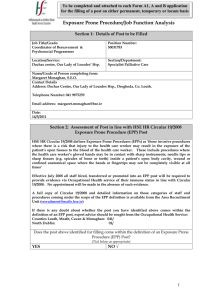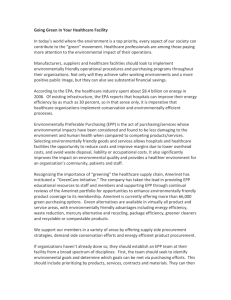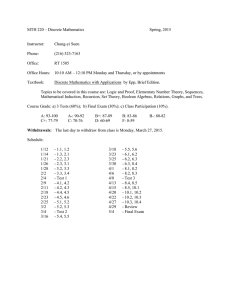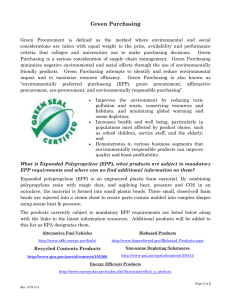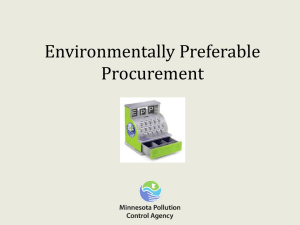Information Technology Solutions
advertisement
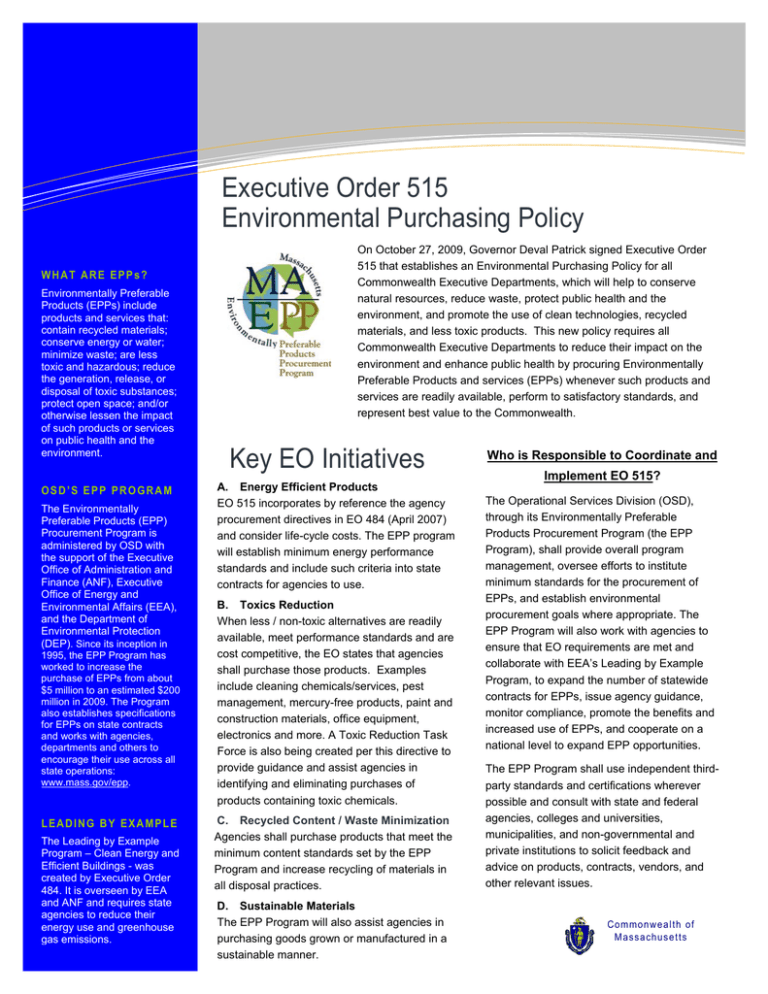
Information Technology Solutions Executive Order 515 Environmental Purchasing Policy WHAT ARE EPPs? Environmentally Preferable Products (EPPs) include products and services that: contain recycled materials; conserve energy or water; minimize waste; are less toxic and hazardous; reduce the generation, release, or disposal of toxic substances; protect open space; and/or otherwise lessen the impact of such products or services on public health and the environment. OSD’S EPP PROGRAM The Environmentally Preferable Products (EPP) Procurement Program is administered by OSD with the support of the Executive Office of Administration and Finance (ANF), Executive Office of Energy and Environmental Affairs (EEA), and the Department of Environmental Protection (DEP). Since its inception in 1995, the EPP Program has worked to increase the purchase of EPPs from about $5 million to an estimated $200 million in 2009. The Program also establishes specifications for EPPs on state contracts and works with agencies, departments and others to encourage their use across all state operations: www.mass.gov/epp. LEADING BY EXAMPLE The Leading by Example Program – Clean Energy and Efficient Buildings - was created by Executive Order 484. It is overseen by EEA and ANF and requires state agencies to reduce their energy use and greenhouse gas emissions. On October 27, 2009, Governor Deval Patrick signed Executive Order 515 that establishes an Environmental Purchasing Policy for all Commonwealth Executive Departments, which will help to conserve natural resources, reduce waste, protect public health and the environment, and promote the use of clean technologies, recycled materials, and less toxic products. This new policy requires all Commonwealth Executive Departments to reduce their impact on the environment and enhance public health by procuring Environmentally Preferable Products and services (EPPs) whenever such products and services are readily available, perform to satisfactory standards, and represent best value to the Commonwealth. Key EO Initiatives A. Energy Efficient Products EO 515 incorporates by reference the agency procurement directives in EO 484 (April 2007) and consider life-cycle costs. The EPP program will establish minimum energy performance standards and include such criteria into state contracts for agencies to use. B. Toxics Reduction When less / non-toxic alternatives are readily available, meet performance standards and are cost competitive, the EO states that agencies shall purchase those products. Examples include cleaning chemicals/services, pest management, mercury-free products, paint and construction materials, office equipment, electronics and more. A Toxic Reduction Task Force is also being created per this directive to provide guidance and assist agencies in identifying and eliminating purchases of products containing toxic chemicals. C. Recycled Content / Waste Minimization Agencies shall purchase products that meet the minimum content standards set by the EPP Program and increase recycling of materials in all disposal practices. D. Sustainable Materials The EPP Program will also assist agencies in purchasing goods grown or manufactured in a sustainable manner. Who is Responsible to Coordinate and Implement EO 515? The Operational Services Division (OSD), through its Environmentally Preferable Products Procurement Program (the EPP Program), shall provide overall program management, oversee efforts to institute minimum standards for the procurement of EPPs, and establish environmental procurement goals where appropriate. The EPP Program will also work with agencies to ensure that EO requirements are met and collaborate with EEA’s Leading by Example Program, to expand the number of statewide contracts for EPPs, issue agency guidance, monitor compliance, promote the benefits and increased use of EPPs, and cooperate on a national level to expand EPP opportunities. The EPP Program shall use independent thirdparty standards and certifications wherever possible and consult with state and federal agencies, colleges and universities, municipalities, and non-governmental and private institutions to solicit feedback and advice on products, contracts, vendors, and other relevant issues. Commonwealth of Massachuse t ts How Are Agencies Impacted by EO 515? FOR QUESTIONS AND GUIDANCE Designated agency staff or agency procurement staff may contact OSD with questions or comments: Marcia Deegler, OSD Director, Environmental Purchasing Marcia.deegler@state.ma.us 617-720-3356 TO VIEW EO #515 To view or download a PDF copy of the EO, please visit www.mass.gov/Eoeea/docs/ eea/lbe/Executive%20Order %20515.pdf EPP Vendor Fair Exhibit Hall Each Secretary and Agency head shall designate and identify to the EPP Program an individual charged with the management and coordination of this program. Such individual may be the LBE Coordinator and/or other personnel deemed necessary to support the implementation and enforcement of the program. As agencies purchase products and services through either statewide contracts or departmental procurements, they are required to ensure that such purchases meet the EPP specifications established for such items. For questions concerning those specifications, agencies may contact either their EPP delegate or the EPP Program Director. In addition, agencies shall: Support and encourage key agency staff participation in EPP procurement training, such as the annual EPP Vendor Fair and Conference; Work with their contractors and agency personnel to provide all necessary support to the EPP Program to ensure that annual FY purchasing data is reported to OSD; Examine the benefits of establishing annual EPP procurement goals and consult with the EPP and LBE programs to target appropriate procurement areas; Ensure that Leading by Example Program Coordinators, or other designated staff, act as liaisons with the EPP Program for issues related to EPP program implementation; and Work to incorporate the use of EPPs in construction, renovation and maintenance contracts, food service contracts, lease agreements, grant programs, and other contracts. Frequently Asked Questions MORE INFORMATION For more information on EO 515, the EPP Program and EPPs on statewide contracts, please visit us on the Web at: www.mass.gov/epp Q. What are the responsibilities of the agency EPP liaison? A. The EPP liaison shall serve as the point of contact for the agency on all matters relative to carrying out the initiatives of EO 515. In general they may be asked to work with the EPP program to target appropriate procurement areas, encourage agency staff to attend trainings, and ensure that agency purchasing data is submitted for the annual report. Q. How will agencies know less-toxic alternatives are available and on what contracts? A. Agencies should consult the EPP Guide to state contracts available for download on the EPP website, www.mass.gov/epp, or call their liaison or the EPP Program Director. Q. What kind of auditing or reporting will be conducted? A. The EO states that an annual report must be submitted to ANF/EEA each year for the prior Fiscal Year EPP purchases. It is the EPP Program’s task to complete the report, but agencies are directed to cooperate with OSD as needed to help obtain this data. Q. What if EPP alternatives are not effective? What do agencies need to do? A. Agencies are required to inform the EPP Program if they believe that an EPP does not meet their needs. Documentation to substantiate the request may vary case by case. Q. Does this EO require Higher Ed to comply? A. Higher education, independent authorities and municipalities are encouraged to adopt the policies of this EO, but not specifically required.
